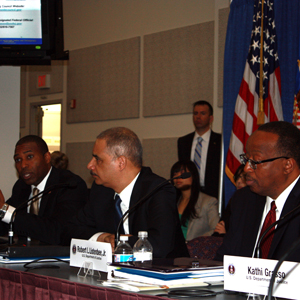
The report, “Children Exposed to Violence,” makes 56 different policy recommendations, and found that more than 60 percent of American children will be exposed to crime, abuse, violence or psychological trauma this year. Exposure to violence can have long-term negative effects on many facets of children’s school, community and workforce experiences, said the report.
On Friday, the Coordinating Council on Juvenile Justice and Delinquency Prevention, an independent executive branch body that coordinates federal juvenile justice prevention activities, met to discuss the federal government’s plans to implement key components of the Task Force’s report. Representatives from many federal agencies, including the departments of agriculture, homeland security, interior and education were there.
Discussing what he hoped would come from the council’s efforts, Office of Juvenile Justice and Delinquency Prevention Administrator Robert Listenbee said, “If we can find every single door that opens to a child, to assess what is going on and get them treatment, then we’ll move this [cause] forward.” As a result, he said, fewer children will enter the juvenile justice and dependency systems because we will know what their issues are in relationship to exposure to violence.
At the meeting, Holder echoed the report’s sense of urgency, stating that now is “not a time to be complacent, it’s a national crisis—the cost of failure is too high to contemplate, [and] turning back the tide of violence is the responsibility of everyone in this room.”
In response to the report, acting Associate Attorney General Tony West announced the creation of a new task force focusing exclusively on American Indian and Native Alaskan children exposed to violence. The unique issues and significant violence facing this population warrant separate attention, he said. The new task force will seek to improve the identification and treatment of American Indian and Native Alaskan children impacted by violence, support communities and tribes to find their own solutions and involve American Indian and Alaskan youth in reform efforts.
Holder also called upon council members to use the report as a “blueprint for action,” carefully considering near- and long- term strategies for implementation, raising awareness, building knowledge and increasing federal coordination. Going forward, he asked members to map and build upon existing federal activities, noting, “we must take advantage of the tools we already have.”
To that end, Larke Huang, council member and senior advisor on children and youth at the Substance Abuse and Mental Health Services Administration, outlined the Department of Health and Human Services’ efforts to capitalize on existing programs and funding and focus on the priority areas of violence prevention, screening/assessment/use of evidence-based approaches and policy advancements. Centers for Disease Control and Prevention’s STRYVE initiative to reduce youth violence and the Administration for Children and Families’ focus on the emotional well-being of children are examples of HHS’ current efforts, Huang said.
However, David Esquith, council member and director of the Office of Safe and Healthy Students at the Department of Education raised concerns. “I am afraid there is a gap in what we know and what we can do,” he said. He urged the council to look critically at the resources schools and educators have on the ground, arguing that the research we have is not making it into the schools.
Ultimately, “understanding the landscape” and being “clear about what measurable outcomes you want to achieve” will be essential to successful implementation of the report, said Laurie Garduque, coordinating council member and director of justice reform at the MacArthur Foundation. With a tough fiscal climate, building on existing initiatives and pooling resources–rather than re-inventing the wheel–will be key to meaningful implementation, she said.
Editor’s note: The MacArthur Foundation is a funder of the JJIE.
Photo by Jessica R. Kendall



























